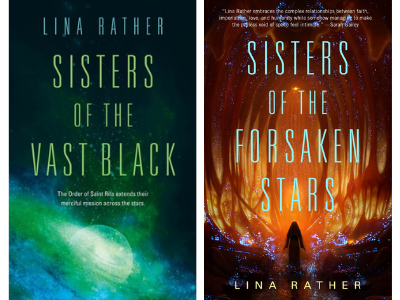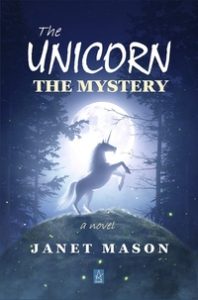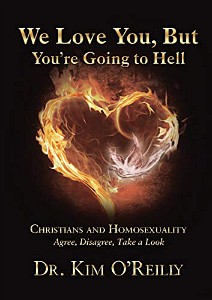Amazon Affiliate Link | Bookshop.org Affiliate Link
As soon as I heard about a series that follows nuns in a living spaceship — that also has a sapphic main character — I had to pick it up.
The sisters of the Order of Saint Rita are ostensibly a Catholic order, but a lot has changed. They have little connection with Earth, ever since a devastating war severed most of the power of the corrupt Earth Central Governance. In the generations since, communities have grown up under their own power in different systems.
Our Lady of Impossible Constellations, their lab-grown organic spaceship, visits those communities that want either baptisms, weddings, or to receive medical care — most of what they do has more to do with medical care than religious offerings.
The series begins slowly, introducing each of the sisters, who all have their own reasons for being aboard the ship. Not all of them are devout, and most have some sort of secret they left behind in order to start this new life. While this is a sci fi story, of course, it feels very grounded. Details like having to sift through spam on their communications array makes it feel like a realistic vision of the future.
The sapphic element comes in when we learn that Sister Gemma has fallen in love with a female engineer she met during one of their stops at a service station. Since then, they’ve been secretly exchanging letters. It’s not the gender of her love interest that’s a problem; it’s the fact that she’s broken her vow by entertaining a romantic relationship at all. This is a fairly small part of the series, but we do get to see Gemma’s journey and struggle in this decision: she loves her sisters and her work tending the ship, and she feels lost outside of that.
While most of the first book deals with the sisters’ internal lives as well as an ongoing debate about whether their ship should be allowed to mate, the action ramps up dramatically at the end, when they are pulled into a conflict that could restart the war that took so many lives — a war that one of the sisters has a horrifying connection to.
In the afterward, the author discusses how this began as a short story, which I can see. It’s definitely a narrative that has more to do with emotions and ideas than a fast-moving plot (until the end). While the second book picks up after all the action in Sisters of the Vast Black‘s conclusion, it still is fairly slow paced, especially when I was expecting it to pick up considerably.
I also unfortunately had trouble keeping track of all the characters. That’s a fault of mine as a reader with a bad memory, but I could only recognize a few of the sisters. Between that and the slow pace, these novellas took me a surprising amount of time to finish. That was made worse in the second book, which doesn’t have any chapters.
While there are interesting ideas explored in this series, I finished it feeling like it would have worked better as a short story for me: it began to drag, and I didn’t feel connected enough to the big cast (in a small amount of pages) to pull me through it. I’m sure that other readers with a better memory and a little more patience for sitting with philosophical reads will enjoy this one, though.



